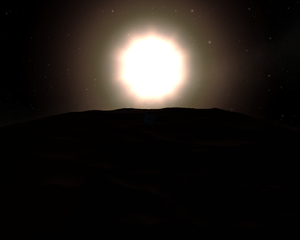Difference between revisions of "Kerbol"
m (cleanup) |
Thecoshman (talk | contribs) (→Planets: Changes to 'Orbiting Bodies') |
||
| Line 73: | Line 73: | ||
All Kerbol orbits are in an inertial reference frame. Getting close enough to experience lower maximum time warps results in attacks by the [[Deep Space Kraken]]. | All Kerbol orbits are in an inertial reference frame. Getting close enough to experience lower maximum time warps results in attacks by the [[Deep Space Kraken]]. | ||
| − | == | + | == Orbiting Bodies == |
| − | + | Kerbol has five orbiting planets; [[Moho]], [[Eve]], [[Kerbin]], [[Duna]] and [[Jool]]; some of these planets have orbiting moons them selves. This star does not have any asteroids or comets orbiting it. | |
== Trivia == | == Trivia == | ||
Revision as of 08:11, 9 October 2012
Kerbol, also known as Kerbin Prime, The Sun, and The Star is a K class main sequence star and parent to the planets Moho, Eve, Kerbin, Duna and Jool.
Reference Frames
| Paid (0.17) | Demo (0.13.3) | |
|---|---|---|
| Warp | Minimum Altitude | |
| 1x | n/a | |
| 2x | 0 m | |
| 5x | ? m (within kill zone?) | ? m |
| 10x | 6,540,000 m | |
| 50x | 13,080,000 m | 16,350,000 m |
| 100x | 26,160,000 m | 32,700,000 m |
| 1000x | 52,320,000 m | 65,400,000 m |
| 10000x | 65,400,000 m | 130,800,000 m |
All Kerbol orbits are in an inertial reference frame. Getting close enough to experience lower maximum time warps results in attacks by the Deep Space Kraken.
Orbiting Bodies
Kerbol has five orbiting planets; Moho, Eve, Kerbin, Duna and Jool; some of these planets have orbiting moons them selves. This star does not have any asteroids or comets orbiting it.
Trivia
Between versions 0.7 and 0.10.1, Kerbol was a mere point of light in the skybox. It became possible to reach in 0.11, and gained gravity in 0.12. Since 0.14, close encounters will result in a collision that destroys the ship and kills all crew members. It is still safe to drop below the "surface" in 0.13.3, but a ship can break up from the extreme gravity gradients and/or shot outwards at large fractions of c.
The current "surface" of Kerbol is an invisible and likely featureless plateau approximately 4500-4700 km above the nominal radius. There is no known way to land on it, as the Kraken makes all maneuvering difficult, and the gravity reduces the TWR of all engines below 1. One can attempt to place edited parts on the surface, but they bounce erratically at a few hundred to a few thousand m/s if they do not explode.
While Kerbol can be reached from Kerbin's orbit by using a Hohmann transfer orbit, a spacecraft doing so will require a ΔV of about 8 km/s to do so. The most efficient way to reach Kerbol from Kerbin's orbit is to use a Bi-Elliptic transfer. With a sufficiently-distant apoapsis, the required ΔV to sundive can be reduced to under 4km/s, at the expense of drastically-increased flight time.
The name "Kerbol" is created by the forum members, it never appears in the game. In the game the star is referred to as "the Sun"
Changes
- Actual model added
- Initial Release
